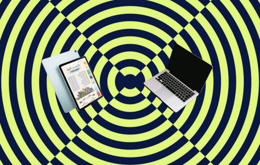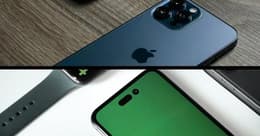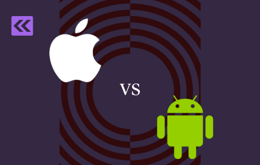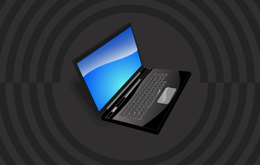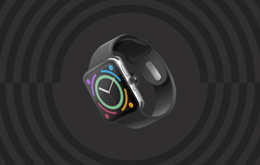
Both the Apple Watch and Samsung Galaxy Watch are smartwatch powerhouses that cater to different preferences. The Apple Watch excels in iPhone integration, user-friendliness, and health features, while the Samsung Galaxy Watch offers wider customization, potentially longer battery life, and a classic watch design.
Shopping for a smartwatch often feels confusing and overwhelming. With new releases and constant upgrades, it's tough to know which one is right for you — especially with top brands like Apple and Samsung battling it out for wrist supremacy.
Are you a fitness fanatic seeking intensive health data? Do you prioritize an existing ecosystem, or are you open to exploring new tech frontiers? By understanding these key distinctions, you'll be on your way to selecting the smartwatch that complements your unique needs and desires.
If you’re looking to upgrade or purchase a smartwatch for the first time, we’ve got you covered.
Keep reading to discover a breakdown of the Apple Watch and Samsung Watch's key features to help you choose the perfect fit for your needs and lifestyle.
Apple Watch vs. Samsung Watch: Differences to know
The Apple Watch is primarily designed for iPhone users, offering full functionality with iPhones. While it can connect to some Android phones, the functionalities will likely be limited.
On the other hand, the Samsung Galaxy Watch offers full functionality with Android phones while offering some compatibility features to iPhone users. But remember that these features might not be as robust as what you'd experience with an Android.
Here's a quick rundown of the key differences between the latest Apple Watch and Samsung Galaxy Watch to help you decide which one might be a better fit for you:
Apple Watch Series 9 | Samsung Galaxy Watch 6 | |
|---|---|---|
Pros | Accurate health sensors Full-day battery life Improved one-handed use — double-tap gesture | Glass front — Sapphire crystal Reliable sleep insights Battery lasts up to 40 hours |
Cons | No blood pressure tracking HRV is available through third-party apps only Better sleep tracking through third-party apps | Fewer upgrades compared to previous models Irregular heart rhythm/ECG function only compatible with Galaxy phones |
Specs
Let's break down the key specifications, or specs, of the Apple Watch and Samsung Galaxy Watch to help you find your perfect match. From screen size and storage to price, here’s what you need to know about each watch.
Apple Watch Series 9 | Samsung Galaxy Watch 6 | |
|---|---|---|
Screen size | 41 mm / 45 mm | Standard: 40 mm / 44 mm; Classic: 43 mm / 47 mm |
Shape | Square | Round |
Design | Aluminium or stainless steel | Aluminium or stainless steel |
Health sensors | Heart rate, blood oxygen, ECG, altimeter | Heart rate, blood oxygen, ECG, altimeter |
Operating system | watchOS 10 | Wear OS 4 |
Price | $400 to $700 | $300 to $430 |
Bottom line: The Samsung Watch offers a wider variety of screen sizes and a lower starting price tag, making it the winner of the specs category. If a larger screen or a lower price is important to you, the Galaxy Watch is a better fit.
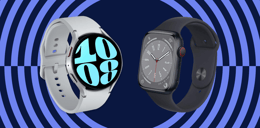
Design
Whether you crave a sleek, modern aesthetic or a classic timepiece look, understanding these design differences is key to finding your perfect match.
Apple Watch: The Apple Watch features a sleek, rectangular OLED touchscreen with a Digital Crown for navigation and a single button. It prioritizes a clean, modern look and integrates seamlessly with watchOS, known for its user-friendly interface with a focus on apps.
Samsung Galaxy Watch: The Samsung Galaxy Watch embraces a timeless look with its circular, always-on Super AMOLED touchscreen with two buttons for functionality. This watch runs on Samsung's Wear OS, known for its wide range of watch face options.
Bottom line: Apple offers a sleek, minimalist look, while Samsung provides more design variety and customizability.
Battery life
The last thing you want is for your watch battery midday. Since battery life is a crucial factor when choosing a smartwatch, here's a Galaxy Watch vs. Apple Watch breakdown:
Apple Watch: This watch has around 18 hours of battery life with normal use and up to 36 hours when in Low Power Mode. It charges relatively quickly, gaining a full charge in around 75 minutes.
Samsung Galaxy Watch: This watch lasts up to 40 hours on one charge with normal use or around 36 hours with high-intensity use. It takes around 3 to 4 hours to fully charge from 0%.
Bottom Line: The clear winner for battery life is the Samsung Galaxy Watch. It boasts nearly double the expected life of the Apple Watch, making it a better choice for those who prioritize minimizing charging needs.
Performance
The Apple Watch and Samsung Watch offer a smooth and responsive user experience, thanks to their powerful processors.
Both watches boast a wide range of health and fitness tracking features, including heart rate monitoring, GPS tracking, sleep tracking, and various workout modes.
Here's a closer look at their performance in specific areas:
Apple Watch: The Apple Watch excels in user experience due to its intuitive watchOS interface and integration with Apple devices. When it comes to health and fitness track, this watch is usually more accurate in heart rate monitoring.
Samsung Watch: The Samsung Galaxy Watch runs on Wear OS, which offers more customization options but might feel less polished. For health and fitness tracking, this watch offers additional features like blood oxygen monitoring and body composition analysis (though accuracy might vary).
Bottom line: Ultimately, the "winner" depends on which features are most important to you. Apple Watch excels in user experience and heart rate accuracy, while Samsung Galaxy Watch offers a wider range of health tracking features and potentially longer battery life for workouts that utilize GPS heavily.
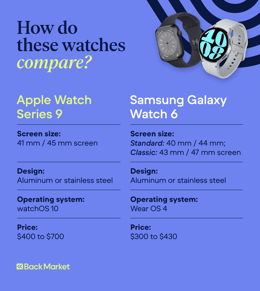
Price
You don’t want to break the bank with your purchase, so budgeting plays a significant role when choosing between the Apple Watch and the Samsung Galaxy Watch. Here's a breakdown of their pricing structures:
Apple Watch: The starting price for an Apple Watch Series 9 depends on the size (41 mm or 45 mm) and cellular connectivity. Aluminium models start around $400, while stainless steel with sapphire glass jumps to $700 or more.
Samsung Galaxy Watch: The Samsung Galaxy Watch 6 also varies in price based on size (40 mm or 44 mm for Standard) and cellular connectivity. If you’re looking for a more affordable option, the Apple Watch is your best choice. The starting price for Galaxy Watch 6 is around $300 for Bluetooth versions.
Bottom line: The Samsung Galaxy Watch has the best price offerings. Whether you’re on a tight budget or need a student discount, this watch offers a significant price advantage.
Shop professionally refurbished Samsung Watch
Bottom line: Is the Samsung Galaxy Watch or Apple Watch better?
Ultimately, the perfect smartwatch depends on your priorities.
Craving a seamless tech ecosystem and a user-friendly interface? Apple Watch shines with its intuitive watchOS and simple integration with iPhones. But if longer battery life and a wider range of customization options are calling your name, the Samsung Galaxy Watch might be a better fit.
If you’re in the market for a new smartwatch, remember that buying professionally refurbished tech is the easiest way to save on items like smartwatches, all while helping reduce environmental impact.


